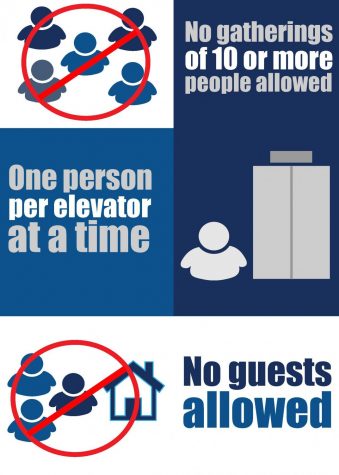New rules in place for near 200 on-campus residents
April 7, 2020
Students will have one more week to request to move back on campus and should do so as soon as possible.
Around 200 individuals are back on campus for the remainder of the semester, so some things have changed for on-campus living.

Students are not allowed to have parties in their building and should not have open alcohol in public areas.
Individuals should also be cleaning up after themselves to lessen the strain on building service workers who will be working in the buildings through the remainder of the semester.
Some new policies have been added to follow orders given by the governor:
No gatherings of 10 or more people are allowed, and students should maintain the recommended six-feet distance when in groups; however, students are also asked to not congregate.
No more than one person should be in the elevator at a time.
Students cannot visit buildings they do not live in and are not permitted to have guests as all individuals should have permission from the Housing and Dining office to be in on-campus residences.
Students are also asked to not share keys with others and to not prop outside doors at their on-campus residence.
All rules and policies in the University Housing & Dining Handbook and the annual housing contract still apply and should be followed.
Those who do not follow the policies can still be written up.
Courtesy hours are still in effect, and students should maintain a low noise level during those hours.
If students need immediate assistance from housing staff, they can find on-call staff numbers at the front desk or lobby of their building.
Students should go to Lawson Hall’s front desk to retrieve any mail or packages they receive.
During this time, students should also be self-screening. If they have symptoms, Eric Davidson, interim director of health and counseling services, explained how to self-screen in an email and encouraged students to do so daily by asking themselves:
Do I have difficulty breathing, like struggling for each breath or shortness of breath when resting or laying down?
Do I have a fever, a temperature of 100.4° F [38.0° C] or greater, when I use an oral thermometer?
Do I have a dry cough, sore throat, runny nose, unexplained lack of smell or taste?
Davidson also mentioned in the email that students may be asymptomatic and should still take preventive measures like:
Practice social distancing/physical distancing by staying at least six feet away from other people.
Avoid being in groups of people or mass gatherings to limit contact with others.
Wash hands often with soap and water for at least 20 to 30 seconds.
Avoid close contact with individuals who have or appear to have respiratory illness symptoms.
Avoid touching the eyes, nose, and mouth with unwashed hands.
Cover coughs and sneezes with a tissue and immediately throw the used tissue away.
Clean and disinfect frequently touched objects and surfaces often to keep them as sanitary as possible.
When feeling sick, stay home to avoid spreading any illnesses you may have.
Corryn Brock can be reached at 581-2812 or at [email protected]
















































